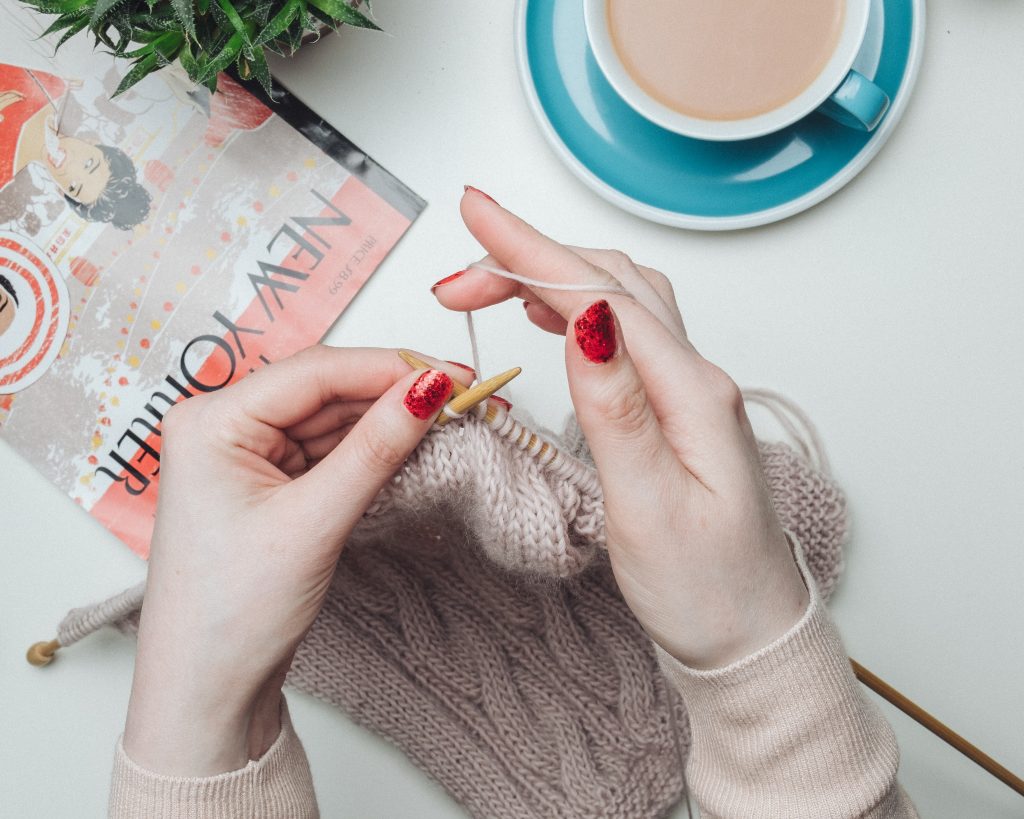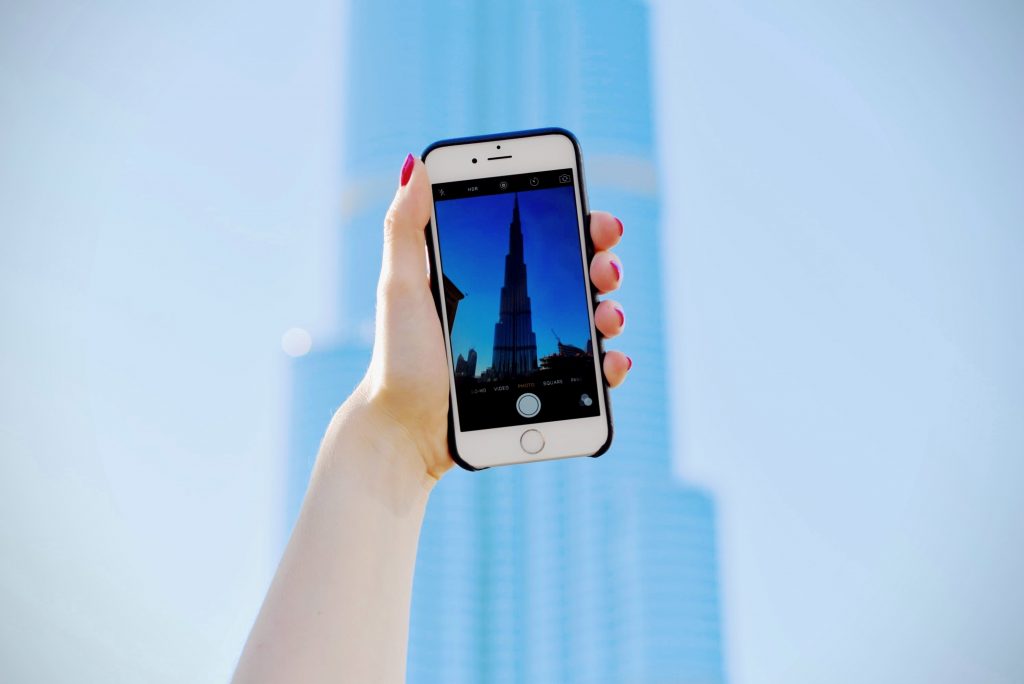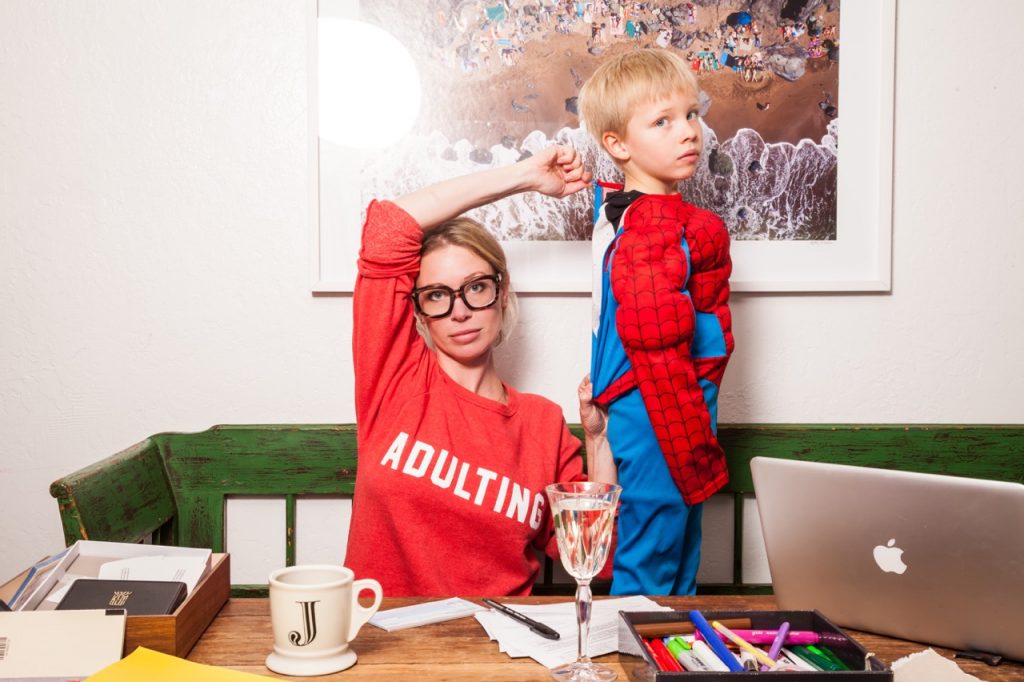
Folk Rebellion founder Jess Davis has made a career of urging people to find meaningful connections through creativity in this screened-in world – and now seems like a better time to listen to her advice than ever. Sign up for Folk Rebellion’s newsletter here. (And because it’s topical, just a reminder that The Big Activity Book for Digital Detox is now available for pre-order.)
The world is suddenly very, very, VERRRRRRRYYYYYY…online.
Yup. Sure! There’s many ways tech is helping us all cope, connect and get the info we need. But there’s also the dark side – which poses all the usual conundrums from tech and digital, but is significantly more magnified in the whole is-the-world-ending? sort of way.
So! Here’s my handy-dandy guide to help YOU manage your tech in trying times, not the other way around.
*Please note this guide was created prior to the global crisis, so the tone is light and cheery. I’ve added a update to each step called The Very Dark Humor Dystopian Edit for Pandemic Times. Please don’t be offended. Laugh.
STEP #1: AWARENESS
Unplug the drug: It’s a great entry point for people see what life feels like without their devices.
To digital detox or not? YES! It’s like eating your first bit of food after a cleanse. You are super aware of your triggers, plus what and how often you consume. So going off the grid is all well and good, but if you return with your same bad habits than no changes will be made. Try it for a week, a weekend, a day. Once you bring awareness to the issues of our screened-in world, you can become more mindful of your tech consumption. This is where the change happens.
Very Dark Humor Dystopian Edit for Pandemic Times: Throw your fucking phone out the window. Trust me. You will feel better. All this busyness planning our new online lives is just a temporary distraction from the reality of how fucked up this all is!!! Stop delaying the inevitable.
STEP #2: SET BOUNDARIES
A lack of boundaries welcomes a lack of respect.
Decide on your personal guidelines. Will you only be near your phone during certain hours of the day? Will your emails only be batched? Will you be Installing a landline, and do you prefer phone calls? Figure out what will work for you, then communicate it. Shout it from the rooftops. Keep in mind that what works best for me might not work for you. Retrain the people in your life to learn the difference between “instant” and “urgent,” and help manage their expectations.
Very Dark Humor Dystopian Edit for Pandemic Times: I am sorry to say, but I cannot join your Google Hangout dance party, because I threw my fucking phone out the window. I appreciate your wanting to stay in touch, but I have never stayed in touch and don’t plan to now.
STEP #3: DEVICE-FREE SACRED SPACES
Without unnecessary phone distractions at key locations in your home, you make more space for connection, creativity, and calm.
Mornings should be sacred alone time for your brain. Remove the cell phone from beside your bed. If your phone serves as your alarm clock, purchase an alarm clock for cheap. Start your day without Kardashian-related breaking news phone notifications infiltrating your brain. Use this time to set your goals and intentions for the day. Other spaces to consider detoxing include the dinner table, bathroom, and desk.
Very Dark Humor Dystopian Edit for Pandemic Times: Every morning is like “DISASTER REPORT” checking in. We don’t have to worry about this, because if you’ve followed my advice you’ve already thrown your phone out the fucking window. Now…let’s talk about Human-Free Sacred Spaces. I’m an introvert who writes from my sanctuary. I love and need my alone time. And yes, you could say that prepared me for the pandemic. But now there’s all these PEOPLE in my space!
HELP.
STEP #4: GET IT OFF YOUR BODY
Try not to have your phone in your pocket or within arms reach at all times.
As a digital addict myself, I’ve noticed that if a device is easy to reach, I check it. To conquer this, I recommend putting some physical distance between yourself and your devices. For focus, stow your phone away in a desk drawer while working on a deadline that requires you undivided attention. For your kids, make an ‘Unplug Box’ Monster. Essentially it’s a shoebox with a hole in it, and kids can than say to parents “It’s time to feed the monster” whenever they are feeling ignored.
Very Dark Humor Dystopian Edit for Pandemic Times: Make the fucking Unplug Box Monster just to have something to do with your kid. It’s Day 7 over here, and I’m not sure if I’m losing my mind, patience, or sense of reality. Is it too early to start drinking? NO. It’s not. Because I just did.

STEP #5: BE HANDSY
Keeping your hands occupied with something helps you unplug.
In my research, I have found that people who do things with their hands for a living or have hobbies involving their hands are less ‘addicted’ to technology. I imagine this is because their hands are always busy. Musicians, makers, artists, dancers, athletes, yogis, surfers: All of them are less tethered to their devices, because they have something in their life either where a phone can’t enter the picture, or where their hands are too busy to be bothered.
Very Dark Humor Dystopian Edit for Pandemic Times: So you’ve always wanted to learn French, you say? We’ll see. Was it lack of time, or just loads of excuses?
STEP #6: WANDER WHERE THE WIFI IS WEAK
Immerse yourself in nature. All of my life’s major decisions, aha moments, and shifts happened after I had spent time outside.
You know that feeling where your brain seems to be sputtering to a halt? Researchers call that “mental fatigue.” One thing that can help get your mind back into gear is exposing it to restorative environments – a.k.a. the Great Outdoors. Studies have found that people sent into the forest for two nights had lower levels of cortisol — a hormone marker for stress — than those who spent that time in the city.
Very Dark Humor Dystopian Edit for Pandemic Times: I’ve never seen so many people have no idea what to do with all their free time. It’s simple. Go for a walk. Kick rocks. Bitch about The Man. Done.
STEP #7: GET ANALOG AF… (AS FOLK)
Fall in love with real life, real things, and the 3-D world.
Tangible isn’t a bad thing. We just let it get cannibalized by the digital tsunami. It’s time to take that space back: When possible, replace screens with actual objects such as books, magazines, and newspapers – this will help train your brain to read long form and may improve focus. Short, digestible online content also incentivizes you to click over to additional content, costing you precious seconds of lost productivity–which, over time, will add up. Other real things? Music on vinyl, cd, or tape, artwork on paper, scrapbooking, photo albums, letters, journals, etc.
Very Dark Humor Dystopian Edit for Pandemic Times: Do this but make sure you’re not wasting your future necessary ass-wiping supplies on collage vision boards. That US Weekly and NYTimes may come in handy in a few months.
STEP #8: BRING BACK MANNERS
WE NEED ETIQUETTE CLASSES FOR THE NEW MODERN WORLD
My mother used to consider anyone who called after 9pm or before 9am rude. Now we send text-message interruption bombs all hours of the day. What if we created a new set of rules around our usage? What would it look like? Would we be courteous and put the phone away for meetings, meals, and while being waited on either at a coffee shop, takeout counter, or restaurant? Could we think before we send an alarming text or stupid meme at 11pm?
Very Dark Humor Dystopian Edit for Pandemic Times: Don’t you fucking touch me. Don’t come near me. Actually please just stop calling me. Oh my god, so many people.
STEP #9: CREATE VS. CONSUME
Less viewing of others’ lives. More creating of IRL experiences in yours.
It’s time to drop the FOMO. The envy. The voyeurism. We are binging on snackable content designed by others to keep us coming back for more. This usually makes us feel yucky and less than, and eventually this habit turns into an addiction. The average attention span has fallen to eight seconds, down from 12 in the year 2000. This is a shorter attention span than the one possessed by a goldfish. I try to gauge the quality of my time on devices by determining whether I am consuming or creating. Consuming adds to the goldfish brain, the jealousy, the inadequacy and the addiction. But being online to create…well, it’s an entirely different ballgame.
Very Dark Humor Dystopian Edit for Pandemic Times: Yeah, yeah: Shakespeare wrote King Lear and Macbeth during a quarantine plague. I’m making rainbows out of pasta noodles and quaran-tinis.

STEP #10: LIVE IN THE MOMENT
Nobody wants to watch your shitty concert video.
As our phones became our cameras and video cameras, we were pulled out of the moment. Graduations, weddings, lying on the couch…all moments – great and small – were documented and stored in our devices and on our clouds. Just as we no longer remember birthdays and phone numbers, our memories are becoming something we can only access when we look at our content. Basically, we are suffering memory loss…from our very own most important moments. The more we record them, the less we remember them.
Very Dark Humor Dystopian Edit for Pandemic Times: Go ahead and share your #throwbackthursdays, because who knows when we’ll be footloose and fancy free again. Document the hell out of your quarantine. If we survive this, it’ll be good to show your grandkids someday.
STEP #11: PRIORITIZE + BATCH
Just because the Internet is 24/7 doesn’t mean that you should be.
Multi-tasking results in a 40%+ decrease in productivity. Creativity is squashed. Anxiety is heightened. The key? Stick to a single task. Handle your most important emails first, and whenever possible, batch emails together. I only read and respond to emails at certain times of the day, some people only on certain days. When possible, limit social media use to desktop only, and at certain times of the day. Don’t respond to engagements on Instagram in real time. The comments can wait. Get back to them the next day at your allotted time. Your brain will spend less time switching between tasks, which will let you unplug faster. Each interruption or toggle takes 23 minutes for you to get back on task and in flow.
Very Dark Humor Dystopian Edit for Pandemic Times: Are you seriously trying to still keep your capitalistic corporate job happy? Get off the goddamned Aoom calls and go for a fucking walk. Can’t you see it doesn’t matter anymore?! Take all that free time and talent from your newly bullshit-free life and focus it on figuring out how to help small businesses that weren’t bailed out by the government in 2 seconds flat.
STEP #12: ENCOURAGE PHONE CALLS
Boostin’ that serotonin one deleted emoji at a time.
It’s sadly ironic that the mediums we’ve created and adopted with the goal of furthering connection have actually left us feeling more alone and more isolated. Researchers have found that a cell phone has the ability to calm a person down when they’re feeling anxious or overwhelmed—you just need to use it to make an actual call. Hearing someone’s voice over the phone has the ability to lower the listener’s stress levels and boost oxytocin (a.k.a. the love hormone). Which is WAY different than getting a winky-face text.
Very Dark Humor Dystopian Edit for Pandemic Times: FaceTime is good. It’s just a lot to be losing your Botox at the same time you’re gaining 10 pounds per week.
Stay Safe.
Stay the fuck inside.
Xx Jess






